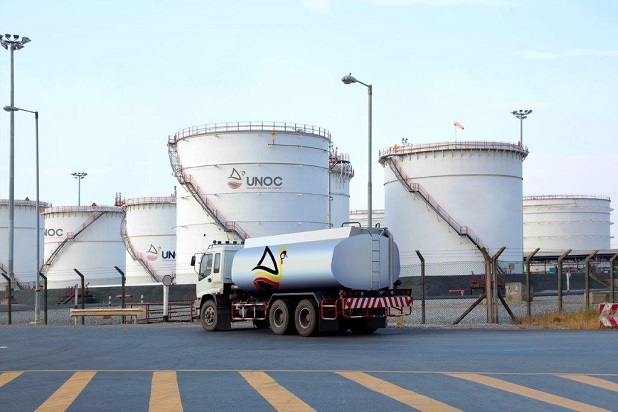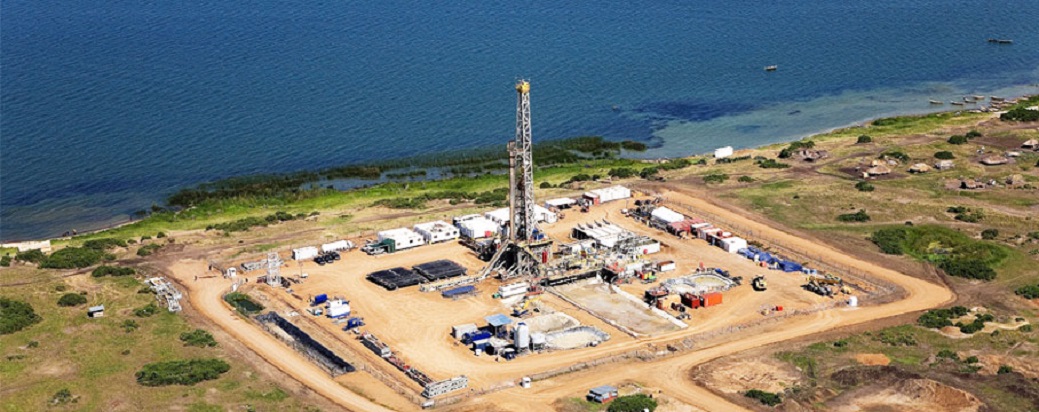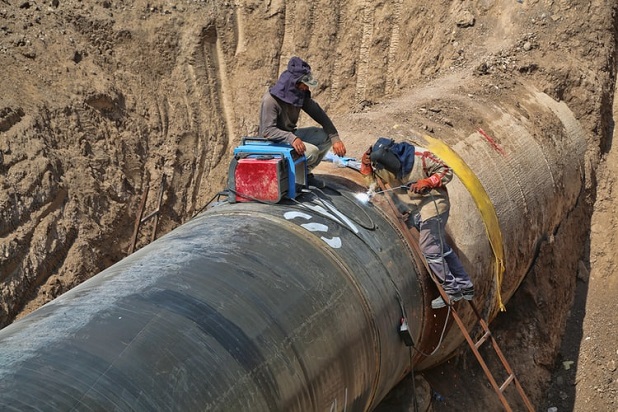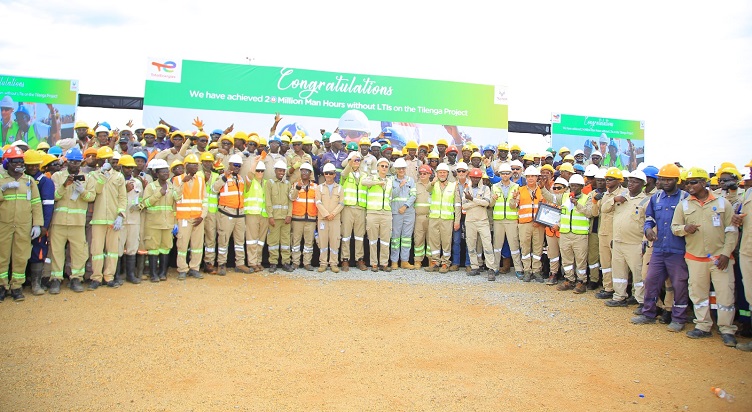The rig (Photo/Courtesy)
After the February 1, 2022 announcement of the Final Investment Decision, the US$ 10 billion investment means major works in the Tilenga, Kingfisher and the East African Oil Pipeline (EACOP) can now take off.
The joint venture partners namely TotalEnergies EP Uganda, CNOOC Uganda Limited and Uganda National Oil Company are ready to deliver Uganda’s first oil by 2025.
Already, facts available show progress in areas such as the International Airport, the Industrial Park at Kabaale and compensation of project affected persons, among others.
For instance, the Hoima International Airport is at 72% completion.
But on the side of Uganda, UNOC stands tall in taking care of Uganda’s interests.
WHO WE ARE/MANDATE
Uganda National Oil Company Limited (UNOC) is a limited liability company solely owned by the Government of Uganda. It was established under Section 42 of the Petroleum (Exploration, Development, and Production) Act and Section 7 of the Petroleum (Refining, Conversion, Transmission and Midstream Storage) Act, both of It was incorporated under the Companies Act of 2012 as a limited liability company on June 12th , 2015.
UNOC is mandated to handle the Government’s commercial interests in the petroleum sector and to ensure that the resource is exploited in a sustainable manner.
The Company is also mandated to investigate and propose new upstream, midstream, and downstream ventures initially locally and eventually internationally.
UNOC has two wholly owned subsidiaries namely the Uganda Refinery Holding Company Ltd (URHC) and National Pipeline Company (U) Ltd (NPC). URHC will hold a participating interest of up to 40% in the impending refinery to be developed in Kabaale, Hoima and manage the development of Kabaale Industrial Park (KIP).
The NPC will hold a participating interest of up to 15% in the 1443-kilometer East African Crude Oil Pipeline (EACOP) on behalf of the Government of Uganda. It will manage the development and operations of storage terminals and pipelines as well develop downstream supply and trading business.
UNOC operates across the petroleum value chain with interests in the upstream (exploration to production), midstream (refining, transportation, and storage) and downstream (bulk trade business) segments of the petroleum value chain.
THE UNOC MANAGEMENT TEAM:



UNOC’S BUSINESS/PROJECTS
UPSTREAM
UNOC holds a 15% participating interest in Tilenga and Kingfisher Development Area on behalf of the State. This is in respect of the two projects in the North and South of Lake Albert respectively.
Following UNOC’s back-in into the Production Sharing Agreements and the Joint Venture Agreements for E1, EA2 and EA3 (Tilenga and Kingfisher developments) in April 2021, UNOC’s joint venture partners in the Upstream are TotalEnergies EP Uganda and CNOOC Uganda Limited.
Although UNOC is a non-operator in the two development areas stated above, UNOC plays a pivotal role in the Joint Venture activities including participating in the joint venture meetings, reviewing, and approving/recommending proposed work programmes and budgets and reviewing bidder lists and recommended contract awards, hence ensuring value retention for Uganda (national content).
On 29th September 2020, UNOC submitted an Application for Qualification (AFQ) to the Ministry of Energy and Mineral Development as a single applicant to participate in the Second Licensing Round which pertained to five prospective license areas namely Avivi, Omuka, Kasuruban, Ngaji and Turaco blocks in the Albertine Graben. The Ministry of Energy and Mineral Development has since invited UNOC to negotiate a production sharing agreement (PSA) regarding Kasuruban block.
Participating in the Second Licensing Round is part of the company’s ambition to eventually become an operator.
Similarly, discussions with CNOOC Uganda Limited over joint acquisition of participating interests in Pelican-Crane continue.
To facilitate Upstream activities, the Parliament passed the Public Finance Management (Amendment) Bill, 2021 and the Income Tax (Amendment) (NO.2) Bill, 2021. The joint venture partners namely TotalEnergies EP Uganda, CNOOC Uganda Limited and Uganda National Oil Company, have since taken a final investment decision on the Upstream (Tilenga and Kingfisher) projects.
MIDSTREAM
UGANDA REFINERY

UNOC, on behalf of the Government of Uganda, shall hold 40% shares in the Refinery Project, acting through its subsidiary, the Uganda Refinery Holding Company (URHC).
The refinery is being developed by the Albertine Graben Refinery Consortium (AGRC), together with URHC. The refinery has a planned capacity of 60,000 barrels of crude oil per day.
The Front-End Engineering Design (FEED) for the Refinery was completed and submitted to Government for review. The FEED focuses on the technical design requirements of the Project as well as the investment cost to an accuracy of +/- 30%.
The Final Investment Decision (FID) is expected in 2022 and thereafter, the detailed Engineering, Procurement and Construction shall commence.
AGRC contracted DNV-GL in joint venture with Atacama Consulting, a Ugandan consultancy firm, to undertake the environmental and social impact assessment (ESIA) studies for the project with support from UNOC.
The ESIA, which identifies the environmental and social impacts of the project in the project area and provides mitigation measures, is at 97% completion.
Part of the ESIA activities are geotechnical and geophysical investigations to study the soil vis-à-vis the refinery machinery. The refinery will be situated at the Kabaale Industrial Park (KIP), a 29.57sq km land in Kabaale, Buseruka, Hoima District.
Also at the KIP, is the Hoima International Airport, which is 72% complete.
Commissioning is planned for quarter one in 2023.

EAST AFRICAN CRUDE OIL PIPELINE (EACOP)
The National Pipeline Company, one of the UNOC subsidiaries, will hold a 15% participating interest in EACOP. Starting at the crude export hub at the Kabaale Industrial Park, it will cross 10 districts into Tanzania and terminate at Chongoleani, Tanga in Tanzania. Due to the waxy nature of Uganda’s crude oil, the pipeline will be heated and insulated. Covering 1443-kilometers, it will be the longest heated pipeline in the world. Uganda and Tanzania in 2017 signed the Inter-Government Agreement.
Recently, both countries completed the respective Host Government Agreements. The Tariff and Transportation, and Shareholders’ Agreements (rights and obligations) were signed on April 11, 2021.
EACOP’s Front-End Engineering Design (FEED) was completed and approved by the Petroleum Authority of Uganda (PAU) in October 2020. Earlier in September 2020, the pipeline’s route was approved by PAU. Also, the final environmental social impact assessment (ESIA) studies report was submitted to the National Environmental
Management Authority on 7th August 2020. The approval and issuance of ESIA certificate occurred shortly after. Tanzanian approved the ESIA and issued a certificate in February 2020.
Compensation of project affected persons is expected to commence in early 2022.
Conditional letters of awards for critical level one contracts, have since been awarded ahead of preliminary works.
To facilitate EACOP activities, Parliament passed the East African Crude Oil Pipeline (EACOP) (Special Provisions) Bill, 2021 and the Public Finance Management (Amendment) Bill, 2021 and the Income Tax (Amendment) (NO.2) Bill, 2021. The joint venture partners namely Total Energies EP Uganda, CNOOC Uganda Limited and UNOC have since taken a final investment decision on the project.
DOWNSTREAM ACTIVITIES
JINJA STORAGE TERMINAL
UNOC operates the Jinja Storage Terminal (JST), a 30-million-liter refined petroleum products storage facility at Jinja, in eastern part of the country. JST is a bonded storage facility, jointly run with One Petroleum, that provides “hospitality” (storing fuel for oil marketing companies) to clients and keeps government strategic stock to ensure security of petroleum supplies. Development of a fuel pipeline and an oil jetty to link the facility to water transport from Kisumu (Kenya) is being undertaken jointly with One Petroleum. This will facilitate oil imports via the lake.

KAMPALA STORAGE TERMINAL
The Kampala Storage (KST) is a greenfield petroleum products storage terminal under development in the central region, approximately 26 kilometres from the Kampala Capital City, off Mityana road (Buyala Trading Centre). The terminal is planned to serve as a storage facility for both Government strategic reserves and providing “hospitality”
(storing fuel for oil marketing companies). It is also planned as a hub for planned refined products pipeline such as the Hoima – Kampala pipeline. The project designs are being progressed, the environmental social impact assessment (ESIA) was completed and procurement of a joint venture partner ongoing.
Bulk Trading business- In this, the Company purchases bulk fuel from supply sources along the value chain, imports into Uganda, and sells to the oil marketing companies (OMCs) for onward distribution to the Ugandan market.
Following acquisition of relevant licenses and regulatory approvals, the business was launched on 16 th March 2021, with a delivery of 430,000 liters of diesel to Stabex International Ltd, one of the leading oil marketing companies. A few transactions have been safely, and profitability implemented, paving way for the desired business development and growth.
The Company plans to position itself strategically within the petroleum products supply chain to import the products (in bulk) from various supply sources and deliver to the oil marketing companies in Uganda, a good portion of their monthly demand. The Company will accomplish this through the strategic partnerships it is establishing, as it seeks to
deliver on its mandate of enhancing the supply of petroleum products into the country, as well as preparing itself for handling the Ugandan refined products.





